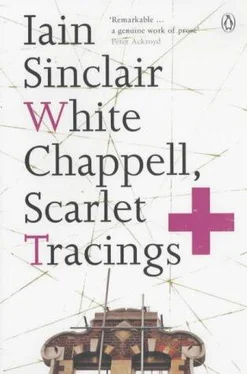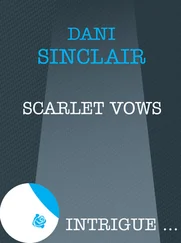As Omega walks towards the street-door, gets his foot on the step, the unmarked, but highly visible, squadcar jerks away. It could have been post-coital anguish, the seams of Policewoman Dudley’s sheer black stockings raked in a savage zigzag, takeaway chinese, hand job — or it might have been a remark. A misplaced compliment. Flushed tyres.
Omega, in his skull cage, saw nothing.
At last J. Leper-Klamm has the grail in his hands, it answers him, his life spills, everything connects. He transubstantiates; he is translated. The pages bleach to glass. The words float in sheets of crystal air. Released. Forming and reforming. ‘Deep in the enemy’s country… Nothing but misfortune and disaster… I was struck… shattered the bone… I should have fallen… worn with pain…’ Icy intimations freeze Klamm’s shirt to his back.
‘Have you settled a price, Sir, for this item? That might be agreeable, Sir, to all parties concerned.’
‘Eight thousand, five hundred,’ Lane added a quick five hundred, seeing Omega divide up the ounces on the threadbare turkey carpet.
‘Would a cheque be satisfactory, Sir?’ said Klamm, patting his pockets, not quite sure if the sum mentioned might not be lurking there, from his last trip to the off-licence.
Lane put a pen in his hand and for the first time in recorded history lifted his beret to mop his scalp.
The door to the room floated inwards like a vertical raft. Something was wrong; it was like looking up at a raft from under the water, some kind of distortion. It returned to the horizontal plane, crushing Omega’s uplifted arm. Quinn was swearing when an axe-handle caught him in the mouth, taking out three of his upper teeth, cleanly, painlessly, with some bits of a few more. He spat blood. Stared at it, hanging from his hand.
‘Get your faces into the floor. Bastards. I want all the stuff you’ve got. All of it.’
There were three of them, black stocking masks, rhino faced: two with axe-handles, the third had an axe-handle with axe attached.
They kicked over the straw laundry basket and pulled the heads off the children’s toys. They smashed up the glass-fronted cabinet. They took all the packets, powders, resins, cash. They destroyed sensationalist, surrealist, gothic, hermetic, lyric and domestic literature, with a fine lack of distinction. They also gave Nicholas Lane a bit of a kicking, staving in a couple of ribs and detaching a kidney. He’d been too busy to vomit for the last week: there was plenty to untank now. Brown and sour and smelling of death.
They took the pamphlet out of Leper-Klamm’s hands and tore it to shreds. If any other collector had been holding a copy it would, at that instant, have doubled in value. Nobody else was. That tunnel into time was sealed.
Perversely, at that precise moment, it flashed into the narrator’s mind that the name of the man who introduced Watson to Holmes was Stamford. So close to the name of the town where their book had been found.
The heavies settled themselves, took a blow, with a vodka bottle, and waited for the yelp of the hungry phone. They knew the whole operation. Omega is made to answer every call. Every mark is told to come on round and to bring the bread.
They arrive, get their heads banged, pockets cut, skewered face down to the floorboards. After a couple of hours the chaps are holding in excess of four thousand pounds. And all the stuff. A human carpet of fowl pluckings.
The phone insisted one last time; a punter looking for anything by Fredric Brown. The man with the axe took the instrument from the wall and wrapped it around Omega’s neck. ‘I think it’s for you, John.’ Was his parting quip. They were gone.
It could have been a mob from the Brewery, sharp-end boys, down on hippie trash, could have been connections of the Scotchman, could have been a double-cross by Suk, dumping some dud stuff, could have been furies from the ether, constructed out of their own paranoia, but whoever it was they wore well-polished black boots, with thick rubber soles, and blue shirts with size 17 collars.
When the worst has happened, and all your fears are confirmed, there is a momentary sense of great calm and well-being. Sometimes.
Break the skin, Quality Chop House, 94 Farringdon Road, Progressive Working Class Caterer ; break the skin down the length of the sausage, split the pink sizzling meat, gristle and fear. Gathering the strength for an assault on the book stalls. Comfortable within this old wood booth, hands around a mug of tea; mindless detachment. Gone back.
From the street there is nothing to be seen. No other use of this time.
Inside the booth, showing solidarity with the workers by eating their sausage sandwiches, you commissars of Stoke Newington, dipping the damp white bread in a gush of crimson vinegar. Squatting on a line of power, aligned, for once, with the drift of the city. Down with the water, from the ponds, the caves of Pentonville, rush with the Fleet, beside its ditch, swept with the dead dogs towards Thames. The domes of Old Bailey and St Paul’s, the hulls of tenements, the office hulks. Everything in the end floats to Farringdon Road, deaths and libraries, sacks and tea-chests, confessions, testaments. The mysteries are shredded and priced. They are offered to the guided hand.
Fed, he plunges. In on a curve, the wall pulls, a knobbled blanket, galloping wave-pattern of the eye, buildings broken up, wide-horizon seizure, sweeping from Saffron Hill to Smithfield and St Bartholomew’s Hospital, rail track gleams below, a dead ladder. Now there are eyes in the back of the head, in the neck, the skin is clairvoyant, hysterical sharpness of nerve: touch is sight. The rippling wall threatens the eye. Eye bleeds into holistic awareness. All of the previous is there with him, he approaches himself, overtaking, rushing in, pain memories. The stalls are sheeted, roped. A lumpy bonehouse.
The MORNING STAR faces east: dim building titled to power. Red lettering, under the float of dust, making a sign but not a word. Low pulse red, receding. Where have you gone, Bill Sherman? Razor’d strips of cloud float in glass: postmortem windows.
The dealers huddle, converse in whispers. Slide a hand along the wall and penetrate the dome of Wren’s machine, whale-melon vibrating in thought-star with other leviathans of the city, to swim back up Thames, the great churches, in a moment of Apocalypse, drowning human frenzy.
The rag-bundle punters connect themselves to the roped tables, secret gases, pulped trees, socks, bones, melted pine veins; vortices of hope ignite. A Siberian railway platform. Clatter of wooden voices.
As he moves, move easy, a pillar of raised dust settles into his heated absence, shadow pools soak his blistered feet. To make this wide sky London workable and safe. To take it on and make it interior. Set it in rain jungle, swallow it in vegetation, break the stones that they emerge again as calcium in the teeth of carnivorous animals. To take the buildings into the blood: as salt. This is his vision. The man becomes the building, the building floats free, shattering into other older structures, into fields of uninterrupted water.
The old men zone in on the tables. They are fierce and muted. They are driven back, abused, by the stallholder in his barber’s jacket, benevolent, tufty headed; as if with pockets of condoms to distribute, with ultimate pornographic secrets. The supplicants are forced against the wall, rubbing their coats on the brickwork, so that when the signal is given they will be propelled with greater velocity towards the naked rubble of books, their dole of half-calf. The skins of odd volumes itching to be consumed again in the cattlepens of Smithfield.
Without preamble I am seized by one of the old ones, not looking into my face, beside me, the tale that must be told, no rest from it. A trembling compulsion; not exorcism, mantraic keen-song. Over and over and over again, the argument of words: soothed, neutralised. I am witness, eyes set on the heap of books, leashed in, waiting. The story poured over me, bones in mud.
Читать дальше












